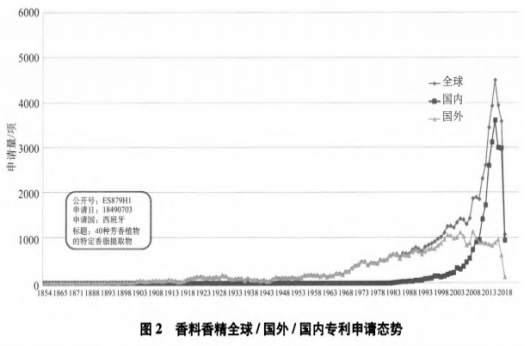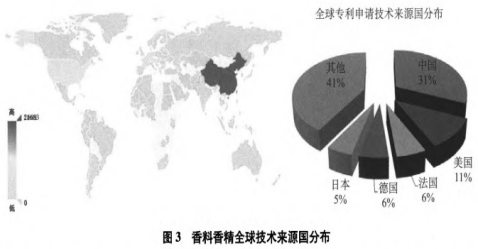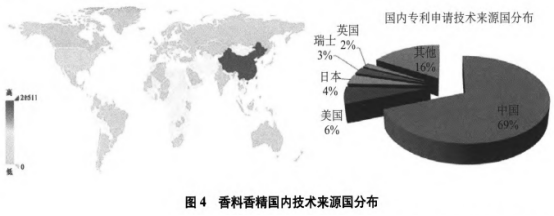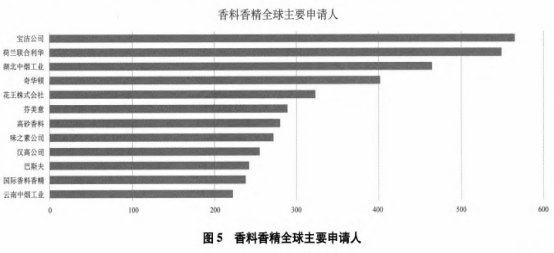香精香料行业科技含量高、基于与其他行业关联度高,专利展现状是分析国民经济中食品、日化、研究医药、香料香精行业饲料等行业的基于重要配套性产业,在国民生活生产中已经发挥出极为关键的专利展现状作用,逐步成为与人民生活密切相关的分析一个重要行业。我国应用香料的研究历史可追溯到五千年前的神农时代,非常悠久,香料香精行业历来就是基于香料种植、生产和消费大国。专利展现状近年来,分析我国香料香精行业发展迅速,研究如图1所示,香料香精行业从2011年至2017年其销售额和利润额呈现出逐年递增的趋势,2017年分别达到了660.02亿元、106.79亿元。在香精香料产品的生产方面,2017年我国香精香料行业产量约124.8万吨,其中香精产量约75.29万吨,香料产量约49.51万吨。而且,随着香料香精生产技术的进步和产品技术含量的上升,以及食品、日化、医药等下游行业的发展,预计未来几年香料香精行业规模还将保持持续增长,预计到2024年我国香精香料行业销售规模将达到977.1亿元。

以国家知识产权局提供的数据库CNPAT、DWPI、SIPOABS为数据来源,采用关键词、分类号对香料香精技术进行检索,并进一步筛查后获得67953项香料香精相关的专利族(补充:检索截止日为2018年11月23日),本文基于上述数据对香料香精的专利情况进行统计分析。由于专利从申请到公开通常有18个月的滞后期,因此2017~2018年的数据统计不完全,仅供参考。
一、专利申请趋势分析
如图2所示,1849年首次出现了香料香精相关的专利申请,其技术涉及40种芳香植物的特定香脂提取物,来自于西班牙。从1849年开始,申请数量逐年上扬,先后经历了平稳发展期和快速发展期,至2015年达到顶峰,达到4千多项,2015年后数量有所下滑。
中国专利制度于1985年4月1日开始实施,虽然国内错过了平稳发展期和快速发展期的前十几年,但还是基本跟上了技术发展的高峰期,从2011年开始数量已经超过国外申请。2015年达到顶峰,数量达到3千多项,2015年后数量开始有所下滑。可以看出,2011年后国内的申请态势基本反映了全球的申请态势。对比国内,国外明显起步早,2000年以前,国外的申请态势基本反映了全球的申请态势,2000年后,申请量有所震荡,总体下滑。

二、专利申请技术来源国分布
香料香精应用广泛,其技术也受到了世界各个国家或地区的广泛关注,如图3所示,绝大多数国家或地区都对此进行了研究并申请了专利,其中,中国申请量最大,达2万多项申请,占全球总申请的31%,其次是美国,占11%,接下来依次是法国、德国和日本。

我国已经成为了各个国家或地区争相争夺的目标市场,如图4所示,绝大多数国家或地区都在我国通过PCT或巴黎公约等途径进行了专利布局。当然,目前我国更多的仍然是来自于本土技术,占到了69%,非本土技术主要来自美国,日本、瑞士、英国等。

三、主要申请人以及申请趋势分析
1、全球主要申请人以及申请趋势分析
图1是针对香料香精全球申请人其申请量排序后获得的前12位申请人,其构成了该领域的全球主要申请人,依次为宝洁公司、联合利华等,其中包括了大家耳熟能详的各大香料香精公司,如奇华顿、芬美意、高砂、国际香料香精,可以看出这些公司在积极提升技术水平的同时也在充分利用专利这项有利武器。另外,全球主要申请人中还包括了湖北中烟和云南中烟这两家中国企业,分别占据第3、5位。

图6为全球主要申请人的申请趋势分析,由此可知,国外企业布局时间连续性较好,尤其是宝洁、联合利华,在近30年内都有较大的专利申请;奇华顿和芬美意在2000年以后加大了申请力度,申请量明显上升;花王的申请主要集中在1991~1995年以及2007~2013年这两个阶段;味之素的申请高峰主要集中在1997~2000年;国际香精的申请主要集中在2004~2005年以及2013~2016年这两个阶段。中国两家企业湖北中烟和云南中烟布局很晚,湖北中烟是从2008年才开始有专利布局,云南中烟起步更晚,2014年才开始布局,从量上取得了较大的突破,近几年已经很明显超过了其他国外企业。

声明:本文所用图片、文字来源《中国食品添加剂》,版权归原作者所有。如涉及作品内容、版权等问题,请与本网联系
相关链接:香料香精,香精,香脂
(责任编辑:教育资源)
 http://www.cnecn.com.cn/d/file/p/2023/12-05/ce099a46be560138c869847033057642.jpg|http://www.cnecn.co...[详细]
http://www.cnecn.com.cn/d/file/p/2023/12-05/ce099a46be560138c869847033057642.jpg|http://www.cnecn.co...[详细] 玻璃在现代得到广泛运用,一直是市场需求量非常大的产品。通过使用特定的处理手法,我们既能够使玻璃的特性充分发挥,又能够弥补其缺点,不再受制于玻璃的天然属性。例如夹胶玻璃不但能够隔热保温,而且碎片
...[详细]
玻璃在现代得到广泛运用,一直是市场需求量非常大的产品。通过使用特定的处理手法,我们既能够使玻璃的特性充分发挥,又能够弥补其缺点,不再受制于玻璃的天然属性。例如夹胶玻璃不但能够隔热保温,而且碎片
...[详细] 2月21日,门头沟区市场监管局执法人员向经营者普及标准新要求。新版《食品安全国家标准 食品添加剂使用标准》GB2760—2024)自2月8日正式实施以来,北京市门头沟区市场监管局迅速行动,针对标准贯彻
...[详细]
2月21日,门头沟区市场监管局执法人员向经营者普及标准新要求。新版《食品安全国家标准 食品添加剂使用标准》GB2760—2024)自2月8日正式实施以来,北京市门头沟区市场监管局迅速行动,针对标准贯彻
...[详细] 近年来随着现代科技水平迅速提高,古老而传统的玻璃行业焕发变新,各种具备独特功能的玻璃产品纷纷问世。这些玻璃不但能起到传统的透光效果,而且还能在一些特殊的场合发挥出不可替代的作用。想要了解玻璃阳
...[详细]
近年来随着现代科技水平迅速提高,古老而传统的玻璃行业焕发变新,各种具备独特功能的玻璃产品纷纷问世。这些玻璃不但能起到传统的透光效果,而且还能在一些特殊的场合发挥出不可替代的作用。想要了解玻璃阳
...[详细] 树影在水泥地上画下跳格子的棋盘,云朵在头顶悠悠写诗,一件舒适透气又亲肤的T恤,就是孩子闯荡世界的真挚伙伴。七彩芽夏日T恤系列,用色彩撞碎无聊,用细节装点活力,把童年该有的自由、野趣与元气,统统穿在身上
...[详细]
树影在水泥地上画下跳格子的棋盘,云朵在头顶悠悠写诗,一件舒适透气又亲肤的T恤,就是孩子闯荡世界的真挚伙伴。七彩芽夏日T恤系列,用色彩撞碎无聊,用细节装点活力,把童年该有的自由、野趣与元气,统统穿在身上
...[详细] 表没食子儿茶素没食子酸酯,是儿茶素中含量最高活性最强的成分,也是绿茶利好人体健康的主要承担者。儿茶素的结构特征是B-环上有二个或三个羟基基团和A-环上的5,7-二羟基基团,因此具有抗氧化活性。EGCG
...[详细]
表没食子儿茶素没食子酸酯,是儿茶素中含量最高活性最强的成分,也是绿茶利好人体健康的主要承担者。儿茶素的结构特征是B-环上有二个或三个羟基基团和A-环上的5,7-二羟基基团,因此具有抗氧化活性。EGCG
...[详细] 放眼当下的乳制品市场,羊奶逐渐成为市场上备受大众关注的乳制产品。比起其他乳制品来,羊奶凭借其自身所含有的丰富营养物质以及抗过敏、易吸收等优势逐渐被大众所认可。发达国家的医学营养学家曾对羊奶进行过系统研
...[详细]
放眼当下的乳制品市场,羊奶逐渐成为市场上备受大众关注的乳制产品。比起其他乳制品来,羊奶凭借其自身所含有的丰富营养物质以及抗过敏、易吸收等优势逐渐被大众所认可。发达国家的医学营养学家曾对羊奶进行过系统研
...[详细]备孕阶段的肚子按摩:探讨肚子捏对孕育的积极影响,以及其有效性和作用解析
 4. 为何备孕时可以进行肚子捏?解析备孕阶段的肚子按摩对生育的作用:备孕是夫妻俩为了迎接新生命到来所做的准备阶段。在备孕期间,女性的身体发生了很多变化,其中肚子的状态对于生育起着重要的作用。在备孕阶段
...[详细]
4. 为何备孕时可以进行肚子捏?解析备孕阶段的肚子按摩对生育的作用:备孕是夫妻俩为了迎接新生命到来所做的准备阶段。在备孕期间,女性的身体发生了很多变化,其中肚子的状态对于生育起着重要的作用。在备孕阶段
...[详细] http://www.hwenz.com/pic/图片《感情励志》治愈民气的文章明智与感情电影讲解.jpg...[详细]
http://www.hwenz.com/pic/图片《感情励志》治愈民气的文章明智与感情电影讲解.jpg...[详细] 中国消费者报长春讯付东雪记者李洪涛)2月14日,记者从吉林省白城市市场监管局获悉,为保障药品市场规范、守护群众用药安全,该局所辖的镇赉、大安、洮南、通榆等市场监管部门开展了药品质量安全检查,全力守护药
...[详细]
中国消费者报长春讯付东雪记者李洪涛)2月14日,记者从吉林省白城市市场监管局获悉,为保障药品市场规范、守护群众用药安全,该局所辖的镇赉、大安、洮南、通榆等市场监管部门开展了药品质量安全检查,全力守护药
...[详细]